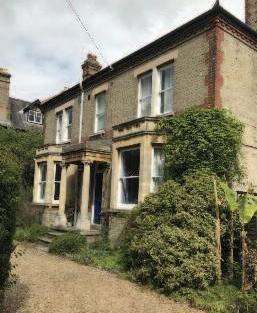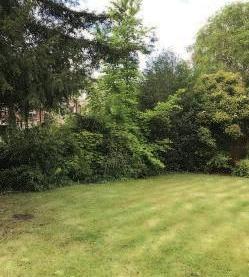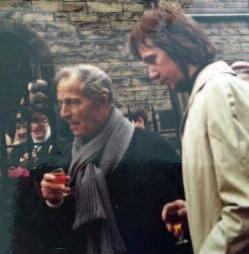
13 minute read
‘This Was My Life’: A Conversation With Nick Firman Loraine Gelsthorpe and Nick McBride
‘This Was My Life’: A Conversation With Nick Firman
Loraine Gelsthorpe and Nick McBride
Advertisement
Nick Firman retired as Head Gardener of Pembroke College in January 2021, after nearly 56 years of service to the College, having joined the College as an apprentice gardener in April 1965 at the age of 16. On a somewhat overcast day at the end of July, we met with Nick in the grounds of Pembroke College and sat down in the Fellows’ Garden to talk about his life at Pembroke. We began by asking him how he became interested in gardening in the first place.
‘I was always interested in gardening at home. My parents actually bought me a small greenhouse when I was 14 or 15 and I used to grow tomatoes and things like that in it. I asked them to get it for me. Then at school we had a period in an afternoon when we could do a subject like woodwork or pottery, and the school had just bought a new greenhouse so obviously I headed straight for that. It had a little plot of ground outside which we could cultivate and grow things on as well.’ Neither of Nick’s parents were particularly interested in gardening –‘Dad used to do the garden, but he wasn’t keen, I think’ – and he attributes his interest to the fact that he ‘was never a great academic and gardening seemed like a nice job, out in the air and fairly relaxed.’
Nick’s exploration of gardening at school was interrupted by his getting the job as apprentice gardener on £5 a week at Pembroke College. Gordon Miller was the Head Gardener at Pembroke, having taken over from Bob Eley. Gordon’s son attended the same school as Nick. ‘Gordon’s son got to hear that I was looking for a job, and he must have told his father, and his father came down to my house to have a chat with me. He invited me back to the college to have a look round. When I went to the college, there was a chap near the rockery who looked like he was a gardener – so I asked him where the gardens department was. It turned out he was Meredith Dewey – he was always being mistaken for one of the gardeners.’
Nick was taken on, and brought under Gordon Miller’s wing. ‘Gordon taught me probably everything I know about gardening. He used to take me round different colleges and on other trips. There used to be something called the Walkerian Society at the Botanic Gardens, and we used to go there for lectures and talks on a Monday evening – though I don’t think that exists anymore. The College also sent me to Milton Farm School [now the College of West Anglia] where I earned certificates in horticulture.’ Interaction with the Fellowship was limited at that time. Fellows might bring their plants to the College greenhouse to be looked after, but otherwise their main contact was with Meredith Dewey, as the Garden Steward. ‘He was a lovely chap – very helpful and nice. He would come down and have a cup of tea and ask if we would do various jobs around the college and on his rockery. We did have to take the chance when he went on holiday to tidy up any gardening work that he had done himself – he was never
that tidy with his work. But he never said anything when he came back from holiday and saw what we had done. We would also find these lumps of coal in the rockery below one of his College set windows – he would throw them at the birds that were pecking at the plants he was growing there. He was a character. I think when he died, he left each of the staff a small amount of money in his will. He was a very nice person and when he retired he moved to Millington Road and had a nice garden there.’
Nick looked back fondly on those early days working in Pembroke: ‘They were good days. There was no electricity in the potting shed, but a much larger greenhouse than now. No computers, no emails. One Garden Steward, which made it easier to make decisions.’
Gordon Miller ‘never used to stop long in any job. He would always be moving on. He used to stop about five years and then move on and take on another garden.’ When Gordon Miller left Pembroke, two other Head Gardeners were appointed in quick succession, and Nick started to look for opportunities elsewhere. Gordon Miller told Pembroke it should try to keep Nick on, and so when the position of Head Gardener fell vacant again, the College was only too happy to accede to Nick’s suggestion that it should take a chance on him and give him the job. So in 1972 Nick got his chance to move up to become Head Gardener, becoming one of the youngest Head Gardeners in Cambridge at the age of only 23.
Nick wasn’t at all intimidated at the thought of becoming Head Gardener at such an early age: ‘When I started, the job wasn’t as complicated as it is nowadays. It was just about gardening, both in the College and around the hostels, where I think we did an excellent job. My plan was just to carry on with what Gordon had been doing in terms of introducing new plants and flowers into the garden. It wasn’t like I was a new guy, intending to do things dramatically differently from how they had been done before.’ He did take advantage of regular meetings of all the Head Gardeners to exchange ideas, and trips to other colleges and the Botanic gardens bore fruit in the form of cuttings, ‘but nowadays there doesn’t seem to be the time to do that kind of thing. Everyone is rushing around doing things, so the Head Gardener meetings just died out.’
A photo from around 1976 shows Nick with his team. Nick is in the centre, at the back, with George Jackson on the left and Alfie Hutter on the right. Tom
Nick with Meredith Dewey
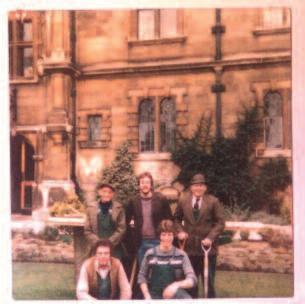
Middleton (the brother of a former College butler) is at the bottom left, and the young man in green dungarees is Guy Fuller – at the time an apprentice gardener at Pembroke, and now Head Gardener at Robinson College. 1976 was also the year of the great drought, and Pembroke ended up in a bit of trouble when the local newspaper noted just how lush and green the lawn in First Court was looking. The Bursar ordered Nick and his team to stop watering the lawn immediately!
The team that Nick had assembled around him was reduced when Bill Grimstone took over as Garden Steward. ‘He had very Victorian principles: two can run the gardens, he would say.’ This put a lot of pressure on Nick, which was eased somewhat once Brian Watchorn, Loraine Gelsthorpe and Geoffrey Edwards were appointed to the Gardens Committee; the size of Nick’s team gradually got back to a more manageable four.
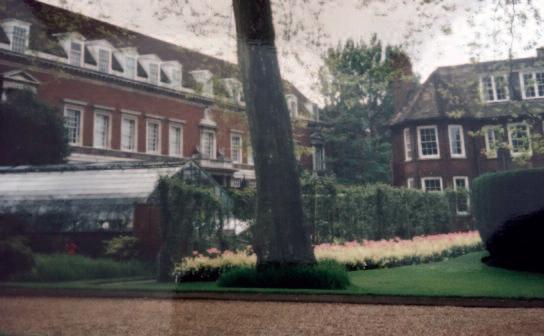
The old greenhouse and Master’s Lodge (both demolished when Foundress Court was built)
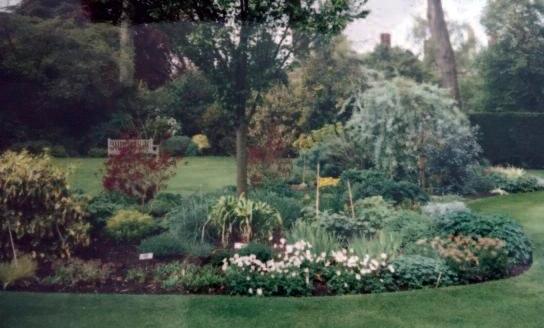
Nick obviously witnessed, and had to cope with, many changes in his time as Head Gardener. ‘The biggest change was the construction of Foundress Court and the New Master’s Lodge. That resulted in our losing a spectacular herbaceous border that was on the site of what become Foundress Court. We also lost the greenhouse and potting shed that we occupied – that was located on the left as you walked through the back gates of the College. To replace that, the current greenhouse was constructed – but it isn’t that practical: it’s too tall to heat very easily. It’s an architect’s dream – I think it was modelled on the plane trees in the avenue – rather than a gardener’s dream. It seems like every time we have moved, our premises have got smaller. So two years after we had got settled in our new quarters, the extension to the Library took away a lot of the new space that had been created for the gardeners. Maybe the development of the Mill Lane site will create a bit more room for storage.’ The expansion of the Pembroke May Balls over time also created complications for the gardeners. What used to involve just one marquee on one lawn now sprawls over multiple lawns. One May Ball which resulted in a lorry getting stuck in the Foundress Court lawn also sticks in Nick’s mind: ‘At least we got a new lawn out of it, I suppose.’
Reflecting on mistakes that had been made in his time at Pembroke, Nick’s thoughts immediately went to the walnut tree in First Court that students and Fellows of a certain vintage will still remember. Having a tree in First Court had always been a dream of Meredith Dewey’s, Nick recalls, but Meredith Dewey had wanted a eucalyptus tree planted there. Instead, the idea of a walnut tree was taken up. Getting the walnut tree established proved difficult: ‘It was planted, pulled up, disappeared, planted, pulled up, disappeared – we even had to go to one of the hostels to collect it, because the students had pulled it up as a joke. In the end the original tree disappeared altogether, so a bigger specimen was planted that would be much harder for the students to pull up.’ And there was no end of difficulties once the tree was established: ‘The trouble was whenever you watered First Court, you would also be feeding the tree, so there were problems with the tree undergoing tremendous growth so that it had to be cut back a great deal. The leaves killed the grass underneath, and you also had problems with the students climbing the tree, and branches falling off. In the end, it was proposed that we should just remove it, and we convinced the council to allow us to do that with the aid of an old photo with showed what First Court looked like before the tree was installed.’ Nick also wonders whether the installation of box hedging around the Bowling Green was a mistake. It was intended to discourage students from running across the Bowling Green, but in practice might have the effect of encouraging students to jump over it or into the hedging.
But any mistakes are more than counter-balanced by the achievements that Nick is most proud of. ‘I am proud of the First Court at this time of year, when you have the geraniums and fuchsias blooming, and also the plumbago – which many people say you have to grow in a greenhouse. It really gives me a buzz when people say “It looks lovely”. The fuchsias are flowers that we have grown ourselves – they aren’t brought in, like they were when Gordon was Head Gardener – and it’s a lot of work. I also like the shrubs and pomegranates and campsis along the Hitcham Building in Ivy Court. The campsis has been there
longer than me.’ Another achievement also represents what Nick thinks will be the biggest challenge for his successor as Head Gardener: ‘Getting everyone working as a team.’ Asked how he achieved this, Nick said, ‘You have to work with people’s different personalities, and guide people, give them challenges and things to do.’ Looking after the new Mill Lane site would also be a substantial challenge, in Summer bedding border in Ivy Court, consisting in Silver Cineraria, particular finding enough Busy Lizzies, and Castor Oil plant water to sustain the flowers, plants and trees that will be a feature of the new site.
The roar of a nearby lawnmower just starting up interrupted our conversation, and prompted a question about the increasing mechanisation of gardening, and how it is paid for. ‘When Gordon started, we only had one mower which would be used for the whole College – by the time it was all done, it was time to start all over again. And we only had a push lawnsweeper, which you would push along to sweep the leaves up. So everything was done by hand. We didn’t have budgets in those days – if I wanted to buy a new machine, I had to go and see the Bursar, Colin Gilbraith, and ask for the money. Now we have budgets, and if there is anything we needed, I could ask for some additional money on the budget to cover that. But no one ever refused us what we needed – we always got what we wanted. We do get complaints about the noise created by things like the leaf blowers, but they do make everything a lot easier than they used to be.’
Nick had opened our conversation by acknowledging that ‘There comes a time when you’ve got to retire. You can’t be going on forever’. By way of finishing our conversation we turned to the question of why he had decided to retire when he did. The decision was triggered by Covid-19. For 35 years, Nick and his wife Julie had been living in, and looking after, one of the student hostels owned by Pembroke on Barton Road. ‘We had to go past students every day to get to our living accommodation and because of my age we were worried about my catching Covid, so we thought it was probably a good time to leave the hostel and retire as Head Gardener.’
Nick and Julie were very sad to leave the hostel and Pembroke after 91 years of service between them: they enjoyed living in the hostel and looking after it. ‘Originally, it was a way of making ends meet. The opportunity of being a hostelkeeper at Barton Road came up, and I had a word with Mr Gilbraith and he gave us the key.’ He reminisced that it used to be the case – in the days before international programmes and large numbers of graduate students studying at Cambridge that resulted in student hostels being used round the year – that
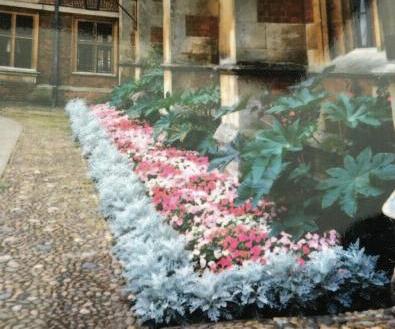
hostel keepers were permitted to let out vacant student rooms during the Long Vacation, so long as they gave the College some of the rent earned by doing so. ‘You had people from other countries staying in the hostel, and you could talk to them and have a chat.’ Nick also enjoyed interacting with the students in the hostels, though he feels older generations of students were more friendly than newer generations have tended to be. Tom Kirkwood stuck in his mind as someone he remembered fondly: he would sometimes play football in the garden with Nick and Julie’s children, who grew up in the hostel alongside the students living there.
The home Nick now shares with Julie has ‘a small garden at the back, paved, with things in pots that need to be watered. It keeps me occupied. I have a big lawn at the front, which a lot of people comment on as looking really nice.’ He misses being involved with looking after the gardens at Pembroke: ‘This was my life. I would be at Barton Road and I would often pop in, even on a Sunday morning. But I would never put in for overtime: it was partly my hobby and partly my job. So to be cut off from that is difficult.’
Our conversation finished, we got up and walked across to the Orchard to take the photograph of Nick that begins this piece, with Nick standing yards away from Meredith Dewey’s rockery, where he asked 56 years ago for directions to the garden department. We hope there will be many more opportunities to reminisce with Nick over such a remarkable period of service to the College – as he said when asked whether there was anything more that he might share with the readers of the Gazette that we had not covered: ‘There is probably still a lot more that hasn’t been discussed.’ With huge thanks to Nick and his remarkable service to the College and its gardens!
The hostel at 26 Barton Road
